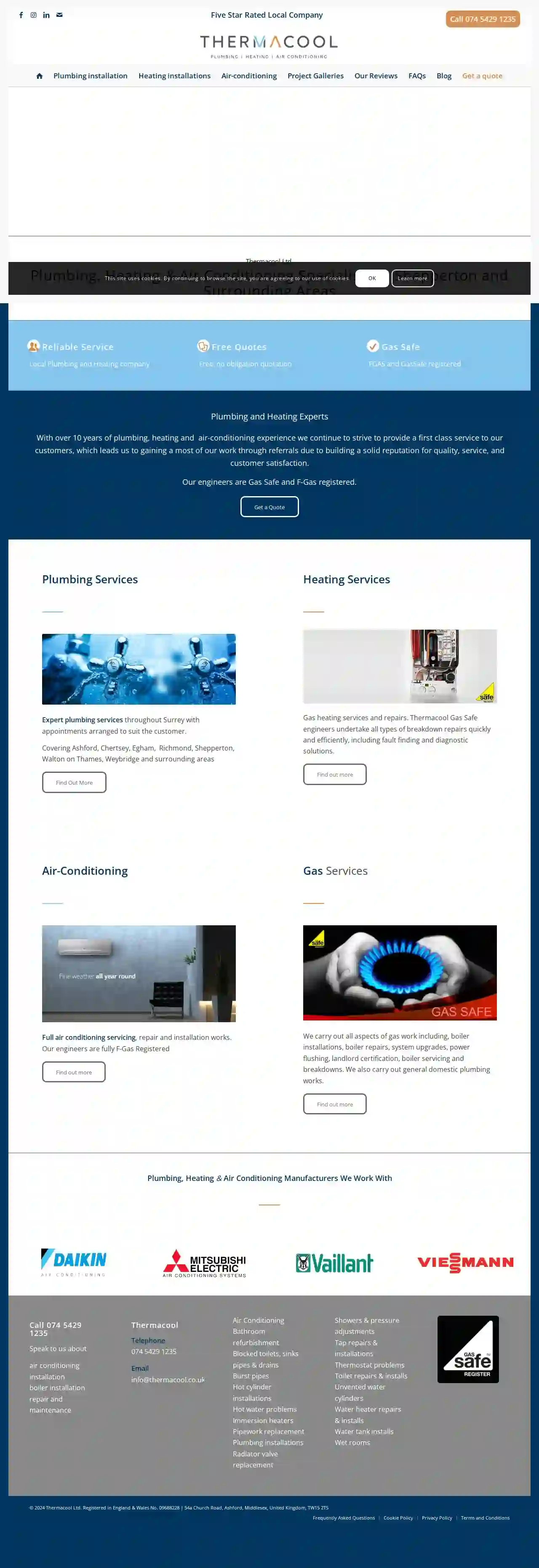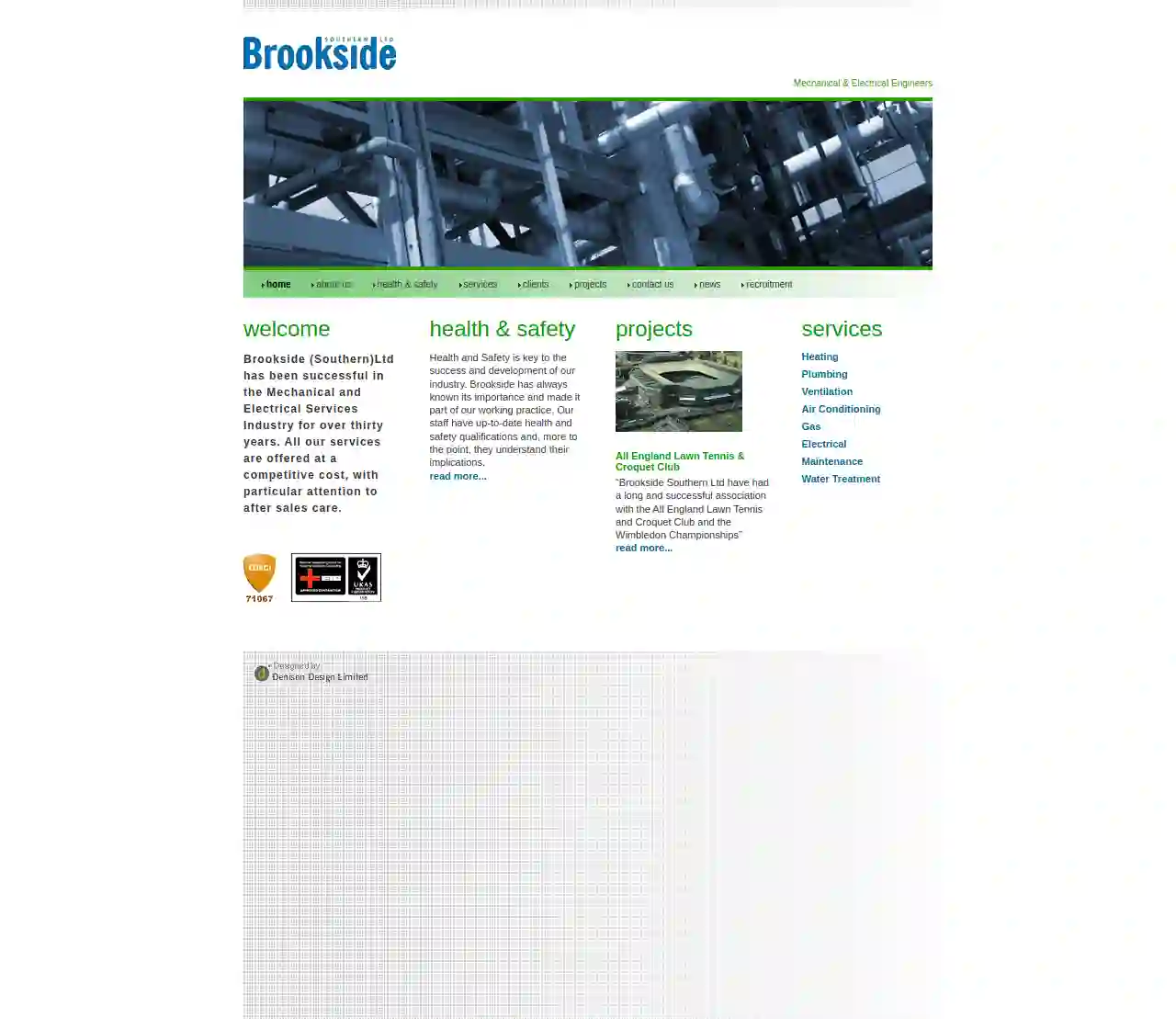Emergency HVAC Windlesham
Find the best Emergency HVAC in Windlesham
Get 3 FREE Emergency HVAC Service quotes for your project today! Compare profiles, reviews, accreditations, portfolio, etc... and choose the best offer.

Evinox Energy Ltd
1.9140 reviewsUnit 37, Barwell Business Park Leatherhead Road, Chessington, Surrey, KT9 2NY, GBEvinox Energy specialise in providing communal & district heating solutions. We offer our own range of smart heat interface units (HIUs) and comprehensive support services including metering, billing, revenue management and service and maintenance. Our range of ModuSat® heat interface units are designed and developed in the UK, tested to the BESA standard, and manufactured in our own production facility.
- Services
- Why Us?
- Accreditations
- Gallery
Get Quote
Thermacool LTD
4.947 reviews54a Church Road, Ashford, TW15 2TS, GBThermacool Ltd. is a plumbing, heating, and air conditioning company based in Ashford, Middlesex, UK. With over 10 years of experience, they pride themselves on providing a first-class service to their customers, earning most of their work through referrals. Their team of Gas Safe and F-Gas registered engineers is dedicated to delivering quality workmanship and customer satisfaction. They offer a wide range of services, including boiler installations, repairs, and servicing, as well as air conditioning installation, repair, and maintenance. Thermacool also provides expert plumbing services, covering everything from burst pipes and hot water problems to bathroom refurbishments and wet room installations.
- Services
- Why Us?
- Accreditations
- Gallery
Get Quote
Fuller Heating
4.319 reviews451 Kingston Road, Epsom, KT19 0DB, GBLooking for trustworthy and reliable heating engineers? Look no further. If you require cost effective, reliable heating and plumbing engineers then look no further. We cater to all domestic and business customer’s central heating systems, gas services and plumbing requirements. Fuller Heating are a long established heating company offering many boiler and plumbing services in Surrey and South West London. Our showroom in Epsom contains a wide range of Worcester Bosch boilers. We are thermotechnology specialists. Established since 1991, we have the knowledge and expertise needed to ensure that you receive nothing but the best service. Our reputation has been developed through hard work and reliability which is why we are the area’s number one choice for plumbing and gas related work. Get in touch today Don’t just take our word for it! Check out our trusted reviews online. Trustpilot Spread the cost of your new boiler with monthly payments. Upfront £625 Including VAT Monthly £22.39 7.9% APR From 2 - 10 years finance options 0% interest free options available 12 year guarantee* Find out more We offer you the highest quality workmanship and services Our Services Include New Boilers Boiler Service & Repairs Heating Controls Renewable Energy Boiler installation & servicing Central heating installations Energy efficiency advice Gas safety inspections Heated towel rail fitting Hob & gas oven fitting Hot water cylinders Kitchen sinks Landlord safety reports Leaks & overflows Power-flushing Pump replacements Renewable energy products Shower & bathroom fitting Heat pumps
- Services
- Why Us?
- Accreditations
- Gallery
Get Quote
Ecowelle Limited
4.333 reviewsEpsom, GBWorking towards a sustainable tomorrow, Ecowelle is a construction company founded in September 2010 in England & Wales. We offer project management, construction applications, building engineering projects, maintenance services, fuel technologies, and systems management. Our mission is to achieve sustainability in societies through affordable solutions. We believe that affordable solutions are key to achieving sustainability and genuinely offer competitive deals and packages for everyone while supporting values in communities, societies, and environment. Our UK, EU, and international operational engagements cover Electrical & Mechanical Engineering, Construction, Catering Engineering, Homes, Renewables, Gas & Fuel Technologies, Facilities, and Heating services and management.
- Services
- Why Us?
- Accreditations
- Gallery
Get Quote
AK Air Conditioning
537 reviewsAshford, GB- Services
- Why Us?
- Gallery
Get Quote
Brookside (Southern) Ltd
32 reviewsWonersh, Guildford, 2 The Common, GU5 0PJ, GBBrookside (Southern) Ltd has been successful in the Mechanical and Electrical Services Industry for over thirty years. All our services are offered at a competitive cost, with particular attention to after sales care. Health and Safety is key to the success and development of our industry. Brookside has always known its importance and made it part of our working practice. Our staff have up-to-date health and safety qualifications and, more to the point, they understand their implications. Our engineers are experienced in their respective disciplines and take pride in what they do. See vacancies for career opportunities with us. All engineers and new recruits must share our commitment to excellent standards. Continual professional training has made for a rich mix of expertise and individual initiative so that we can offer you a first class service. Brookside (Southern) Ltd is fully registered with CORGI and NICEIC. Est. since 1971 Brookside was launched in 1971 to provide heating and plumbing services. Over the years, it has developed into a very successful business. We have expanded our range to include design consultancy, ventilation, air conditioning, and electrical services. We also provide a comprehensive building maintenance operation. We work both as a primary contractor and as a nominated subcontractor. Protecting you Our maintenance business protects you. It is far more cost effective to foresee problems than to solve issues after they have caused damage and loss to your business. The potential for breakdown is considerably lowered by anticipating critical periods such as the extreme temperatures in the middle of summer or in winter and keeping all equipment maintained and serviced. Flexibility Brookside benefits from the careful attention to clients associated with a family business, yet the team is open to new ideas and experience, possessing the imaginative energy of a new enterprise. We are committed to providing our clients with a solution that best fits their needs. Our project managers have hands-on responsibility for the day to day management of our sites and all projects are monitored to ensure they reach our consistently high standard and meet the tightest deadlines.
- Services
- Why Us?
- Accreditations
- Gallery
Get Quote
SAV Systems
4.416 reviewsScandia House, Boundary Road, Woking, GU21 5BX, GBSAV Systems Ltd is a leading provider of renewable technology and Heat Network expertise for heating, cooling, and ventilation. We work in partnership with key manufacturers and system specialists to design, technical and service support for the entire energy system. Our products include CHP, Electric Boilers, Heat Pumps, Large-Scale Heat Pumps, HIU, CIU, KURVE, EnergiRaven, FloCon, AirMaster, UMS-54, Energy Meters, Pt40, Rt40, Ft40, and more. We are committed to decarbonising the UK's heat and believe that both heat networks and individual heat pumps will play a crucial role in reaching Net Zero. Our team of experts offers advanced engineer training, CPDs, and design support to ensure that our solutions perform as intended.
- Services
- Why Us?
- Accreditations
- Gallery
Get Quote
ReaderAir
4.84 reviewsWoking, GBReaderAir is a building services company providing mechanical and electrical maintenance programmes for landlords, managing agents and tenants in the commercial property sector. ReaderAir offers a competitive service to facilities management with quality and responsibility as its key operating objectives.ReaderAir is a specialist provider for the Design, Installation, Maintenance and Repair of Air Conditioning, Fresh Air ventilation and Refrigeration systems that operate within commercial and industrial buildings.We provide contracted support services for the technical assets operating in multi-let commercial buildings. A dedicated and customised preventative maintenance plan to suit the clients property and tenants requirements. A blend of core in house skill sets and managed sub contractor services allow for a quality driven service delivered in a time efficient manner. Facilities managers can deal directly with the source of the services being provided.
- Services
- Why Us?
- Gallery
Get Quote
Rowlen Commercial
Epsom, 53 Richlands Avenue, GBRowlen Commercial is an industry leader for commercial boiler support, helping clients across the country to get the support they need to keep their businesses warm and working. Our Services Talk to our experts... Focused on keeping your commercial boiler working... We are proud to offer a client-centric service that provides you with the support you need to keep your commercial boiler working so that you can focus on making a success of your business. We take a modern approach and work hard to provide support services in plain English, helping you to understand your boiler better than ever before. Our goal is to keep your business warm, 365 days of the year... We know that boiler companies often offer a ‘traditional’ service, keeping boiler knowledge shrouded in mystery and leaving you feeling helpless when something goes wrong. At Rowlen Commercial, we do things differently, believing that the more informed our clients are, the better their boiler will be able to work.
- Services
- Why Us?
- Accreditations
- Gallery
Get Quote
Arctic Cooling Services
52 reviewsCamberley, GBArctic Cooling Services is a leading provider of air conditioning and refrigeration solutions with over 30 years of experience. We offer a range of services including installation, repair, and maintenance for both commercial and domestic clients. Our team of highly skilled engineers is dedicated to providing a prompt and efficient service, ensuring customer satisfaction and happiness. With a strong focus on quality and reliability, we have built a reputation for delivering cost-effective solutions that meet our clients' needs.
- Services
- Why Us?
- Our Team
- Gallery
Get Quote
Over 12,692+ HVAC Businesses in our network
Our HVAC companies operate in Windlesham and beyond!
HVACCompaniesHub has curated and vetted the Best HVAC Contractors in and around Windlesham. Find a trustworthy contractor today.